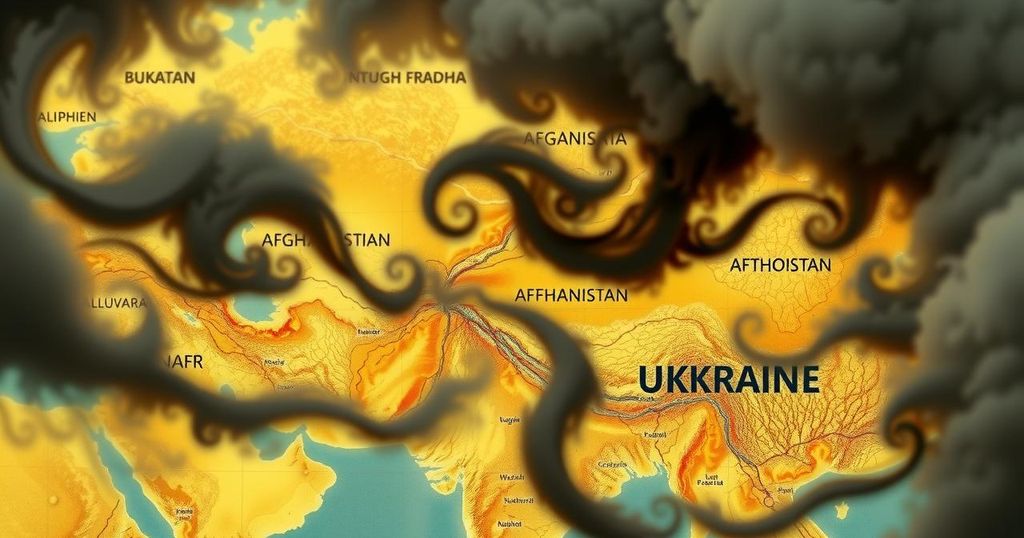Senator Lindsey Graham warned that abandoning Ukraine would be disastrous, likening it to the U.S. withdrawal from Afghanistan. The U.S. has suspended intelligence sharing with Ukraine amidst tensions involving President Trump and Ukraine’s leadership, raising concerns about Ukraine’s defense capabilities. Upcoming peace talks may dictate the future of U.S.-Ukraine relations, emphasizing the need for continued support.
Senator Lindsey Graham, a Republican from South Carolina, has issued a grave warning against the abandonment of Ukraine amid its conflict with Russia, stating that such a move would be “worse than Afghanistan.” His warning comes as the United States has provided substantial military and humanitarian aid to Ukraine since the onset of the invasion three years ago. Despite President Donald Trump’s criticisms of Ukraine and his favorable comments about Russian President Vladimir Putin, Graham has maintained strong support for Ukraine while occasionally challenging Trump’s decisions.
In light of recent tensions, including a contentious meeting between Trump, Vice President JD Vance, and Ukrainian President Volodymyr Zelensky, the U.S. has temporarily suspended intelligence sharing with Ukraine. This pause in intelligence sharing is part of a broader review of U.S.-Ukraine relations by the White House, with national security adviser Mike Waltz emphasizing a reassessment of the relationship. The cutoff is concerning for Ukraine, as U.S. and NATO intelligence has been vital in their efforts against Russian forces.
In an interview on Fox News, Graham expressed his concerns about this intelligence suspension, emphasizing the need for continued support to Ukraine while the conflict endures. He reflected on the potential risks of withdrawing U.S. support, likening it to the chaotic U.S. withdrawal from Afghanistan, which resulted in a swift Taliban takeover and a large-scale evacuation of Afghans fearing retribution.
Trump’s recent negotiations with Putin and his remarks about potentially imposing sanctions on Russia indicate a complex evolution of U.S. support for Ukraine. He has suggested large-scale banking sanctions in response to Russia’s military aggression and has urged Ukraine to expedite their peace negotiations. Trump’s frustration with Zelensky was apparent during their meeting, where he pressured the Ukrainian leader to agree to terms that align with U.S. interests in Ukrainian minerals.
The atmosphere during the White House meeting signified a stark deviation from traditional diplomatic engagement. Vance’s remarks to Zelensky underscored the gravity of U.S.-Ukraine relations, suggesting that Zelensky was failing to show adequate respect for U.S. support. The discussion ended without a signed mineral deal, leaving the future path toward peace uncertain.
Criticism surrounds the U.S. administration’s decisions, particularly regarding the intelligence freeze, which some view as potentially detrimental to Ukraine’s defense. Upcoming talks between U.S. and Ukrainian officials in Saudi Arabia could pave the way for a peace agreement, which may also involve an economic securities deal.
In summary, Senator Graham’s warnings emphasize that discontinuing support for Ukraine could have severe consequences, potentially mirroring past failings in U.S. foreign policy. The upcoming negotiations highlight the critical need for cohesive, strategic U.S. involvement in ensuring Ukraine’s stability and addressing the ongoing conflict with Russia.
In conclusion, Senator Lindsey Graham’s warning regarding the abandonment of Ukraine highlights the critical implications such a decision could have on international relations and stability. The suspension of intelligence sharing indicates a significant reevaluation of the U.S. stance, raising concerns about the effectiveness of Ukraine’s defense against Russia. As negotiations for peace progress, it is imperative that the U.S. maintains its commitment to support Ukraine, both militarily and diplomatically, to avert repeating past foreign policy mistakes.
Original Source: www.newsweek.com




